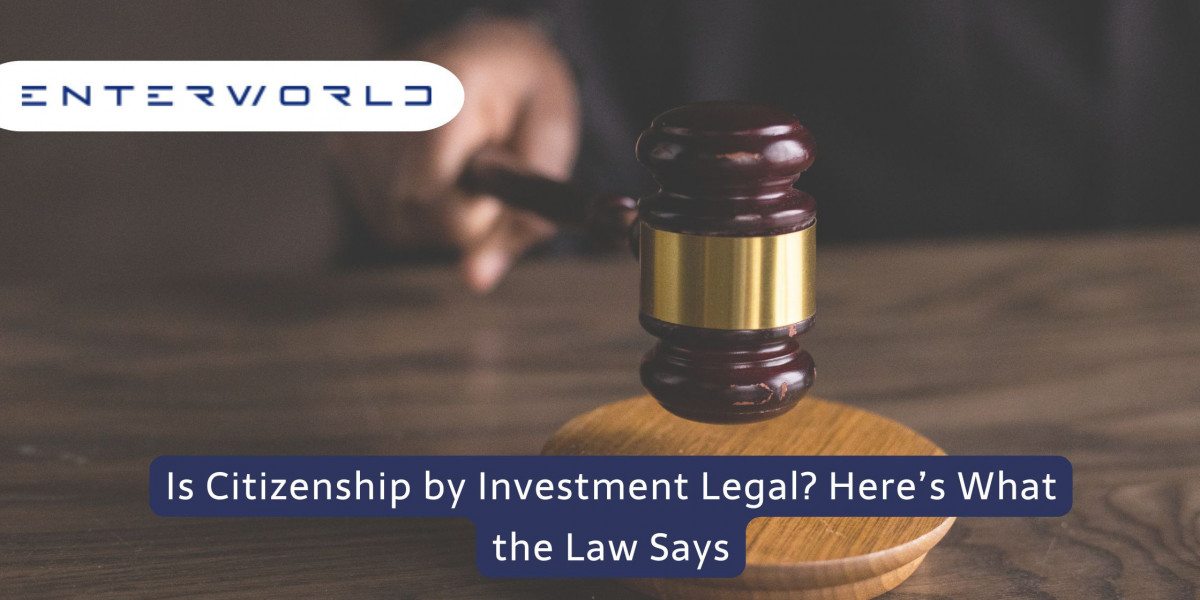In an increasingly globalized world, citizenship by investment (CBI) has become a popular route for high-net-worth individuals looking for greater travel freedom, security, or new business opportunities. But despite its popularity, a common question keeps surfacing: Is citizenship by investment legal?
The short answer is yes—citizenship by investment is legal in countries that have officially adopted such programs through legislation. However, it’s also a topic surrounded by myths, misunderstandings, and, sometimes, controversy.
In this post, we’ll walk you through what the law says, which countries offer legal CBI programs, and what you need to know before taking this route to second citizenship.
What Is Citizenship by Investment?
Citizenship by investment is a process where a country grants citizenship to an individual (and often their immediate family) in exchange for a qualified investment. That investment typically goes toward:
Government bonds
Real estate
National development funds
Local business or infrastructure projects
It’s a formal legal process, and not to be confused with illicit methods or schemes that promise citizenship under the table.
The Legal Framework Behind CBI
For a CBI program to be legal, it must be backed by national law. That means the country’s government has passed legislation that allows non-citizens to obtain nationality through investment—just as they might offer citizenship through marriage, descent, or long-term residency.
Here’s what typically makes it legal:
Legislative Authorization: The country’s citizenship laws clearly allow for naturalization through investment.
Regulatory Oversight: There's an official government body or agency managing the process.
Due Diligence: Applicants go through background checks and meet eligibility criteria.
Public Records: In many cases, newly naturalized citizens are recorded publicly or officially, as part of the transparent legal process.
So yes, when done through an authorized, government-backed channel, CBI is 100% legal.
Which Countries Have Legal Citizenship by Investment Programs?
As of now, several countries have active and legal CBI programs, mostly in the Caribbean and a few in Europe and the Pacific. Here are some notable examples:
Caribbean Nations:
St. Kitts and Nevis (since 1984)
Antigua and Barbuda
Dominica
Grenada
St. Lucia
These countries have legally enshrined CBI into their national laws and operate official government programs. They offer relatively fast processing and visa-free travel to many countries, including the Schengen Area and the UK.
European Nations:
Malta (offers citizenship under exceptional service by direct investment, legally approved by government regulations)
Austria (citizenship may be granted under special contribution to the nation’s interest, although not part of a formal public CBI program)
Pacific Nations:
Vanuatu offers a legal CBI program with one of the fastest processing times globally.
Note: Some countries have suspended or discontinued their CBI programs due to EU pressure or policy shifts (e.g., Cyprus and Bulgaria), but that does not affect the legality of programs still in operation.
Is It Legal to Have Dual Citizenship?
Another common concern is: Will I be allowed to keep my current citizenship if I obtain another through investment?
Most CBI countries allow dual citizenship. However, your current country of citizenship might have restrictions.
Things to check:
Does your home country allow dual citizenship?
Will acquiring another citizenship affect your tax status?
Are you subject to military service, exit taxes, or legal obligations in your home country?
Always consult with an immigration attorney or cross-border legal expert before applying.
International Legal Perspective on CBI
There’s no international law that prohibits citizenship by investment. Each country has full sovereignty over how it defines and grants citizenship, as long as it complies with international norms such as:
Not issuing citizenships to fugitives or individuals under international sanctions
Conducting proper due diligence to prevent financial crimes
Maintaining transparency with international partners (like FATF and OECD)
The European Union has raised concerns about certain programs (especially in EU countries) because of risks related to money laundering or lack of proper vetting, but these are policy concerns—not declarations of illegality.
Red Flags: When It’s NOT Legal
While CBI is legal in many countries, there are illegal or fraudulent schemes out there. Here’s how to spot them:
No official government website or agency
Promises of “passport in 3 days” with no background check
Companies offering fake documents or IDs
Programs not listed or recognized by international organizations
A legitimate CBI program will have a structured process, official government endorsement, and legal safeguards. If it feels too easy, it’s worth questioning.
Conclusion
Citizenship by investment is a completely legal and regulated process—when done through government-authorized programs. It's a legitimate way to gain second citizenship for those who meet the requirements and follow the legal path.
As an entrepreneur, investor, or global citizen, second citizenship can offer valuable benefits: global mobility, economic opportunities, asset protection, and more. But like any serious investment, it should be approached with due diligence, legal guidance, and a clear understanding of what you're signing up for.
Before choosing a CBI program, research the laws of both your home country and the destination country. And when in doubt, consult professionals who specialize in immigration, tax, and international law.
FAQs
1. Is citizenship by investment recognized internationally?
Yes. Citizenship granted through legal government programs is recognized under international law, as each nation has sovereign rights over its citizenship laws.
2. Will a second passport affect my taxes or obligations?
It might. Some countries (like the U.S.) tax citizens on worldwide income regardless of where they live. Always check with a cross-border tax advisor before applying.
3. Can I lose citizenship obtained through investment?
In rare cases, yes. If you’re found to have lied on your application, committed crimes, or violated terms, the granting country may revoke your citizenship.










